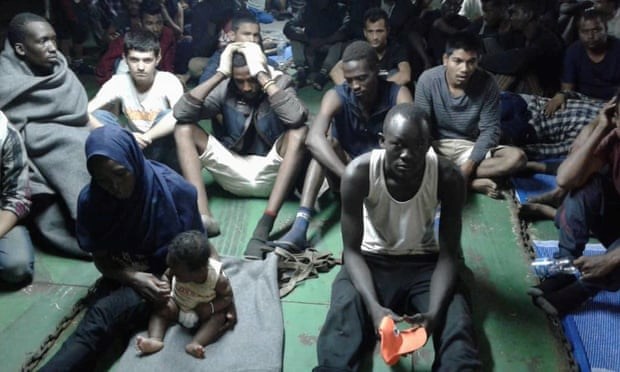
Sunday November 18, 2018
Lorenzo Tondo in Palermo

Migrants onboard the container ship Nivin. Many of them have refused to disembark in Misrata in Libya. Photograph: AP
A total of 81 people on the cargo ship, some from Sudan, say they are staying put
Eighty-one migrants have refused to disembark from a merchant ship off the coast of Misrata in Libya, according to reports.
The migrants were rescued by the ship’s crew a week ago on 10 November, 115 miles east of Tripoli, after leaving Libya on a raft.
Fourteen people decided to leave the cargo ship and were transferred to Libya, while the remaining 81 have refused to disembark in Misrata for fear of being sent back to Libyan detention camps.
“I prefer to die on this ship,” one of the migrants told Médecins Sans Frontières (MSF) when offered to be transferred to a Libyan medical facility.
MSF’s Twitter account stated that “others aboard the ship, including minors, had been imprisoned and tortured for over a year at the hands of human traffickers”.
“It’s a shame that once again the only response given to people in search of safety is prolonged arbitrary detention in the country they desperately attempt to leave,” said Julien Raickman, the MSF head of mission in Libya.
For over a year, the Libyan coastguard, supported by Italy, has been patrolling the waters and stopping boats from leaving Libyan shores for Europe. Under the terms of the deal, Italy agreed to train, equip and finance the Libyan coastguard.
Amnesty International estimates that about 20,000 people were intercepted by Libyan coastguards in 2017 and taken back to Libya.
Italy’s collaboration with Libya to stop migrants has been harshly criticised by human rights groups amid allegations that it has led to grave human rights violations against those crossing the Mediterranean, including torture and slavery.
The International Organisation for Migration (IOM), the UN’s migration agency, said it had provided food and water to the 81 migrants but they were refusing to disembark.
A Sudanese 17-year-old onboard the ship told MSF that his brother and friend had both died at the hands of smugglers near Tripoli.
“How come you want me to leave the ship and stay in Libya? We agree to go to any place but not Libya,” he told volunteers.
MSF medical teams were granted access by the Libyan coastguard so they could treat all those in need.
Doctors have provided 60 medical consultations in three days. “We mainly treated burns from the engine petrol spills and witnessed the despair aboard,” MSF said.
“There is clearly a lack of search and rescue capacity and coordination in the central Mediterranean now,” said Michaël Neuman, director of research at MSF.
“People are effectively getting trapped. Europe’s policy of refusing to take in rescued people has led to a spike in deaths at sea and is fuelling a harmful system of arbitrary detention in Libya.”
NGO rescue boats have almost all disappeared from the central Mediterranean since Italy’s minister of the interior, Matteo Salvini, announced soon after taking office this summer that he was closing Italian ports to non-Italian rescue vessels.
People seeking asylum are still attempting the risky crossing but, without the rescue boats, the number of shipwrecks are likely to rise dramatically.
The death toll in the Mediterranean has fallen in the past year, but the number of those drowning as a proportion of arrivals in Italy has risen sharply in the past few months, with the possibility of dying during the crossing now three times higher.
According to the IOM, so far in 2018 more than 21,000 people have made the crossing and 2,054 have died.